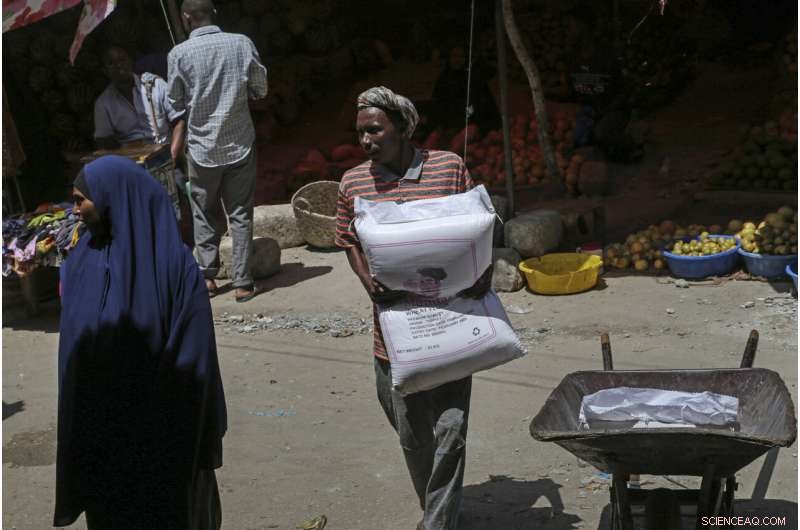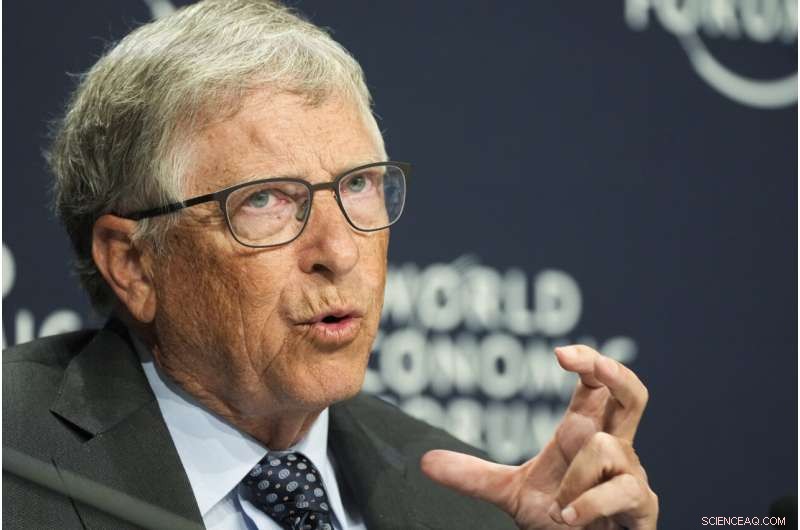
Un uomo porta un sacco di farina di frumento importata dalla Turchia nel mercato Hamar-Weyne nella capitale Mogadiscio, Somalia giovedì 26 maggio 2022. Bill Gates ha esortato i leader mondiali a non rinunciare agli obiettivi che si sono prefissati di ridurre la fame e la povertà nonostante enormi recenti battute d'arresto documentate in un nuovo rapporto pubblicato martedì 13 settembre da The Bill e Melinda Gates Foundation. Credito:AP Photo/Farah Abdi Warsameh, File
Bill Gates afferma che la crisi globale della fame è così immensa che gli aiuti alimentari non possono affrontare completamente il problema. Ciò che è anche necessario, sostiene Gates, sono i tipi di innovazioni nella tecnologia agricola che ha finanziato a lungo per cercare di invertire la crisi documentata in un rapporto pubblicato martedì da The Bill e Melinda Gates Foundation.
Gates indica, in particolare, una svolta che chiama "semi magici", colture progettate per adattarsi ai cambiamenti climatici e resistere ai parassiti dell'agricoltura. Martedì la Fondazione Gates ha anche pubblicato una mappa che modella il modo in cui i cambiamenti climatici influenzeranno probabilmente le condizioni di crescita delle colture in vari paesi per evidenziare l'urgente necessità di agire.
Assegnando alla tecnologia un ruolo preminente nell'affrontare la crisi alimentare mondiale, Gates si mette in contrasto con i critici che affermano che le sue idee sono in conflitto con gli sforzi mondiali per proteggere l'ambiente. Notano che tali semi hanno generalmente bisogno di pesticidi e fertilizzanti a base di combustibili fossili per crescere.
I critici sostengono anche che l'approccio di Gates non affronta l'urgenza della crisi. Lo sviluppo di "semi magici" richiede anni e non fornirà immediatamente sollievo ai paesi che attualmente subiscono sofferenze diffuse perché dipendono dalle importazioni di cibo o stanno attraversando una siccità storica.
È un dibattito che potrebbe intensificare la pressione internazionale per raggiungere gli obiettivi condivisi per la prosperità e la pace globali, noti come Obiettivi di sviluppo sostenibile delle Nazioni Unite, prima della scadenza del 2030. I 17 obiettivi includono porre fine alla povertà e alla fame, combattere il cambiamento climatico, fornire accesso ad acqua pulita, lavorare per la parità di genere e ridurre la disuguaglianza economica.
"È piuttosto deprimente rispetto alle nostre speranze per il 2030", ha detto Gates, 66 anni, in un'intervista all'Associated Press. Ha aggiunto, però, "Sono ottimista sul fatto che possiamo tornare in carreggiata".
Gates ha indicato la guerra in Ucraina e la pandemia come le principali cause dell'aggravarsi della crisi della fame. Ma il suo messaggio agli altri donatori e leader mondiali che si riuniranno per l'Assemblea Generale delle Nazioni Unite questo settembre è che gli aiuti alimentari non saranno sufficienti.
"È positivo che le persone vogliano impedire che i loro simili muoiano di fame quando conflitti come l'Ucraina interrompono l'approvvigionamento alimentare", scrive Gates nel nuovo rapporto. Ma il vero problema, dice, è che molti paesi insicuri alimentari non producono abbastanza del proprio cibo, un problema che sarà sicuramente esacerbato dalle conseguenze del cambiamento climatico.
"La temperatura continua a salire", ha detto Gates. "Non c'è modo, senza innovazione, di avvicinarsi anche solo a nutrire l'Africa. Voglio dire, semplicemente non funziona."
Come ha fatto per più di 15 anni, Gates ha chiesto investimenti nella ricerca agricola, mettendo in evidenza i semi di mais che prosperano a temperature più elevate e in condizioni più asciutte rispetto ad altre varietà. Quei semi sono stati sviluppati nell'ambito di un programma della African Agricultural Technology Foundation a cui la fondazione ha donato 131 milioni di dollari dal 2008.
Da allora, la Gates Foundation ha speso 1,5 miliardi di dollari in sovvenzioni incentrate sull'agricoltura in Africa, secondo Candid, un'organizzazione no-profit che ricerca le donazioni filantropiche. La Bill and Melinda Gates Foundation è per certi versi la più grande fondazione privata al mondo ed è meglio conosciuta per il suo lavoro sulla salute globale, compresi i vaccini. Ha avuto inizio nella sua forma attuale nel 2000, dopo che Gates ha lasciato la sua posizione di CEO in Microsoft, il gigante tecnologico che ha co-fondato. Forbes stima che il suo patrimonio netto sia di circa $ 129 miliardi.
The foundation's spending on agricultural development is why Gates' view on how countries should respond to food insecurity has taken on heightened importance in a year when a record 345 million people around the world are acutely hungry. The World Food Program said in July that tally represents an increase of 25% from before Russia invaded Ukraine in February and a 150% jump from before the pandemic struck in the spring of 2020.
In Ghana, field trials for four varieties of modified seeds began in 2013. But only this past summer has one been approved for commercialization, said Joeva Rock of the University of Cambridge. Activists there, she said, have asked whether those resources could have been better spent elsewhere.
"What would happen if those went into increasing funds to the national research centers in Ghana, to building roads, to building storage, to building silos or helping to build markets?" said Rock, who has written a book about food sovereignty in the country.
When asked, Gates acknowledged the importance of infrastructure like roads and other transportation systems.
"If you want your inputs like fertilizer to come in, if you want your output to go out, it's just too expensive in Africa without that infrastructure," he said, adding that building and maintaining roads is highly expensive.

Bill Gates, Co-Chair, Bill &Melinda Gates Foundation, speaks at a news conference during the World Economic Forum in Davos, Switzerland, Wednesday, May 25, 2022. Gates urged world leaders not to give up on the goals they set to reduce hunger and poverty despite huge recent setbacks documented in a new report released Tuesday, Sept. 13 by The Bill and Melinda Gates Foundation. Credit:AP Photo/Markus Schreiber, File
Some researchers question the wisdom of pursuing the fundamental premise that Gates has embraced:Increasing agricultural production through the use of modified seeds along with fertilizers and pesticides. They point to the environmental footprint of industrial agriculture, including the use of fossil fuel-based fertilizers, the degradation of soil quality and the diminishing of biodiversity.
Alternatives could include agroecological interventions, like developing locally managed seed banks, composting systems to promote soil health and pesticide interventions that don't rely on chemicals, experts said. Over time, those approaches can reduce the need for food aid and build more resilient farming systems, according to Rachel Bezner Kerr, a professor of global development at Cornell University.
Kerr, a lead author of the food chapter of the latest report from the International Panel on Climate Change, said that while the panel doesn't make recommendations, "overall, the kind of focus on a few technologies and reliance on fossil fuel-based inputs isn't in line with ecosystem-based adaptation" or a biodiverse future.
Mark Suzman, CEO of the Gates Foundation, defends its approach warning that limiting access to fertilizers means farmers cannot increase their yields.
"Fertilizer is necessary. You simply cannot meet the overall productivity gains without it," Suzman said, speaking on a call with reporters.
In his interview with the AP, Gates himself dismissed criticisms of the foundation's emphasis on modified seeds.
"If there's some non-innovation solution, you know, like singing 'Kumbaya,' I'll put money behind it," Gates said. "But if you don't have those seeds, the numbers just don't work." He added, "If somebody says we're ignoring some solution, I don't think they're looking at what we're doing."
Another project the foundation has funded is the development of computer models that try to measure crop loss caused by disease or pests. The idea is to direct research and responses to where they are needed most.
"It's not just, how do we get through this crisis and get back to normal? It's, what does the future normal look like?" said Cambria Finegold, the director of digital development for CABI, an intergovernmental nonprofit that is developing the models.
Melinda French Gates, the other co-chair of the Gates Foundation, highlighted in a separate letter the halting progress toward gender equity worldwide. Since January, the foundation has expanded its board, adding six new members to help direct its work, a move that followed the announcement of the Gateses' divorce last summer.
French Gates has agreed to step down after two years if the two decided they could not continue to work together. French Gates, who also founded an investment organization called Pivotal Ventures, was not available for an interview.
Gates said he is lucky that his former wife has continued to put her time and energy into the foundation. In July, Gates said he would contribute $20 billion to the foundation in response to the significant setbacks caused by the pandemic, raising its endowment to approximately $70 billion.
Through his giving, investments and public speaking, Gates has held the spotlight in recent years, especially on the topics of vaccines and climate change. But he has also been the subject of conspiracy theories that play off his role as a developer of new technologies and his place among the highest echelons of the wealthy and powerful.
Gates said he does not spend time thinking about conspiracies and that his foundation's work has nothing to do with his personal reputation.
"If you go into these countries, they've never heard of me or the foundation," Gates said. "Maybe in the rich world somebody is reading some internet thing, but the people we care about have never, will never, and it's not important that they ever know who I am." + Esplora ulteriormente
© 2022 Associated Press. Tutti i diritti riservati. Questo materiale non può essere pubblicato, trasmesso, riscritto o ridistribuito senza autorizzazione.